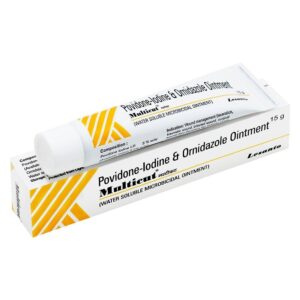ORNIDAZOLE + POVIDONE IODINE
Ornidazole: Ornidazole is an antibiotic medication used to treat various types of infections caused by certain bacteria and parasites. It is commonly used to treat infections of the gastrointestinal tract, reproductive organs, and skin.
The mechanism of action of Ornidazole involves disrupting the DNA synthesis process in microorganisms, leading to their death. This drug inhibits the activity of DNA gyrase and topoisomerase enzymes, which are involved in the replication and repair of bacterial DNA. By interfering with these processes, Ornidazole effectively kills the bacteria and parasites causing the infection.
The standard adult dose of Ornidazole for most infections is 1.5 grams (g) as a single dose or divided into two doses taken on the same day. For amoebiasis, a single dose of 1.5 g is recommended for adults, while children may be prescribed a lower dose based on their weight. The dose and duration of treatment may vary depending on the specific infection being treated, so it’s essential to follow the doctor’s instructions.
Like any medication, Ornidazole has potential side effects. Common side effects may include nausea, vomiting, diarrhea, stomach discomfort, headache, dizziness, and a metallic taste in the mouth. These side effects are generally mild and temporary. However, if any severe or persistent side effects occur, it is important to seek medical attention immediately.
Ornidazole is generally not recommended for use in pregnant women, especially during the first trimester, unless the potential benefit outweighs the risk. It is also not recommended during breastfeeding as drug metabolites can be excreted in breast milk.
As with any antibiotic, it is important to complete the full course of treatment prescribed by the healthcare provider, even if symptoms improve before the course is finished. Stopping the medication too early may result in the infection not being completely eradicated and can contribute to the development of antibiotic resistance.
Povidone Iodine: Povidone iodine, also known as iodopovidone or iodine PVP, is an antiseptic and disinfectant medication used to prevent and treat infections. It is commonly used for cleaning wounds, surgical incisions, and as a preoperative skin preparation.
The mechanism of action of povidone iodine involves the release of iodine, which has broad-spectrum antimicrobial activity. It acts by oxidizing the bacterial proteins, inhibiting bacterial enzyme systems, and damaging the bacterial cell wall. It is effective against a wide range of bacteria, fungi, viruses, and protozoa.
Povidone iodine is available as a solution or gel. The concentration of iodine varies depending on the preparation. For wound cleaning, it is usually diluted to about 1% concentration, while higher concentrations may be used for surgical prepping.
The application of povidone iodine depends on the specific use. For wound cleaning, the affected area is typically washed with a diluted solution and then covered with a clean dressing. For surgical site preparation, the area is usually cleansed using a higher concentration of povidone iodine solution and allowed to dry before the procedure.
While povidone iodine is generally safe to use, there are some potential side effects to be aware of. These may include skin irritation, burning, itching, and allergic reactions. In rare cases, it can cause skin discoloration. Prolonged or excessive use may lead to systemic absorption of iodine, which can cause thyroid dysfunction.
It is important to note that povidone iodine should not be used on deep, puncture wounds, serious burns, or animal bites. It is also not recommended for use in individuals with a known hypersensitivity to iodine or thyroid-related disorders.
As with any medication, it is advisable to follow the instructions provided by a healthcare professional or read the product label carefully to ensure proper and safe use of povidone iodine.

